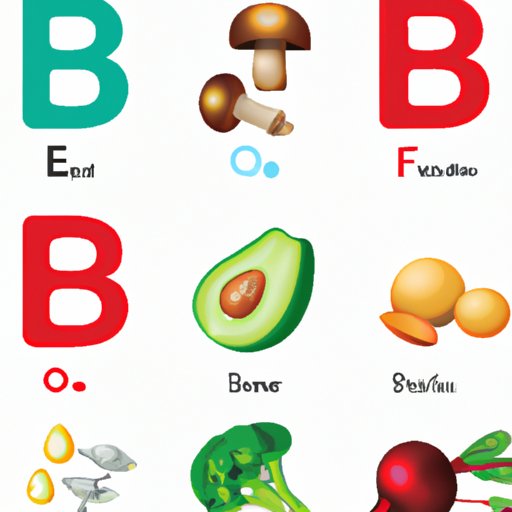
I. Introduction
Vitamin B is an essential nutrient that plays a critical role in maintaining good health. It is responsible for keeping our nervous system healthy, producing red blood cells, and converting food into energy. However, despite its importance, many people do not get enough vitamin B in their diets. In this article, we will explore the different types of vitamin B, their roles in the body, and the best vitamin B-rich foods to include in your diet.
II. A Comprehensive Guide to Vitamin B-Rich Foods
There are eight different types of vitamin B, with each playing a unique role in the body. These include thiamin (B1), riboflavin (B2), niacin (B3), pantothenic acid (B5), pyridoxine (B6), biotin (B7), folate (B9), and cobalamin (B12).
Each type of vitamin B has different sources, with some being more abundant in animal-based foods, while others are found primarily in plant-based options. For example, vitamin B12 is only found in animal-based foods, while folate is found in abundance in leafy greens, lentils, and other plant-based options.
Some of the top sources of vitamin B include:
- Meat, poultry, and fish
- Eggs and dairy products
- Dark, leafy greens
- Whole grains
- Lentils and beans
Consuming vitamin B-rich foods has many health benefits, including improved brain function, healthy skin and hair, and a stronger immune system.
III. Are You Getting Enough Vitamin B?
If you are not consuming enough vitamin B in your diet, you may be deficient in this essential nutrient. Some signs of vitamin B deficiency include:
- Weakness and fatigue
- Irritability
- Numbness or tingling in hands and feet
- Muscle weakness
- Difficulty concentrating
To determine if you are deficient in vitamin B, you can get your levels tested by a healthcare professional. They may recommend increasing your intake of vitamin B-rich foods or taking supplements if you are severely deficient.
IV. From Meat to Veggies: An In-Depth Look at the Best Vitamin B Sources
Whether you are a meat lover or vegetarian, there are plenty of delicious and nutritious vitamin B-rich foods to choose from. Here are just a few options to consider:
Meat, Poultry, and Fish
Meat, poultry, and fish are some of the most abundant sources of vitamin B. Beef liver, for example, contains over 1000% of the recommended daily intake of vitamin B12, while a single serving of salmon provides over half of the daily recommended intake of vitamin B6. Other vitamin B-rich meats include chicken, turkey, pork, and lamb.
Eggs and Dairy Products
If you are looking for vitamin B-rich foods that are also high in protein, eggs and dairy products are great options. One large egg, for example, contains around 10% of the recommended daily intake of vitamin B7, while a cup of milk contains over 20% of the daily recommended intake of vitamin B12. Other vitamin B-rich dairy products include cheese, yogurt, and butter.
Dark, Leafy Greens
Dark, leafy greens like spinach, kale, and collard greens are excellent sources of folate, which is essential for healthy fetal development and may also reduce the risk of certain cancers. They also contain small amounts of other B vitamins, such as riboflavin and thiamin.
Whole Grains
Whole grains like quinoa, brown rice, and whole wheat bread are excellent sources of many B vitamins, including thiamin, niacin, and folate. They are also high in fiber and other important nutrients.
Lentils and Beans
Lentils, beans, and other legumes are some of the best sources of vitamin B, particularly folate and thiamin. They are also excellent sources of protein, fiber, and other essential nutrients.
V. How to Improve Your Vitamin B Intake Through Food: A Beginner’s Guide
Incorporating vitamin B-rich foods into your diet does not have to be difficult. Here are some tips to help you get started:
Balance Your Diet
Make sure to include a variety of vitamin B-rich foods in your diet to ensure you are getting enough of each type of B vitamin. Focus on lean meats, low-fat dairy products, whole grains, and lots of fresh fruits and vegetables.
Prepare Your Food Correctly
Cooking can impact the vitamin B content of certain foods. To preserve as many nutrients as possible, steam your vegetables or cook them quickly in a stir fry. For meats, poultry, and fish, grilling or baking is generally a healthier option than frying.
Alternative Sources for Dietary Restrictions
If you are following a vegan or vegetarian diet, or have other dietary restrictions, you may need to look for alternative sources of vitamin B. Some vegan-friendly options include fortified cereals, nutritional yeast, and almond milk.
VI. Top 10 Foods That Are Packed with Vitamin B: The Ultimate List
If you want to ensure that you are getting plenty of vitamin B in your diet, consider incorporating some of these top 10 vitamin B-rich foods:
- Beef liver
- Clams
- Salmon
- Chicken breast
- Lentils
- Spinach
- Fortified breakfast cereals
- Milk
- Almonds
- Asparagus
VII. The Benefits of Vitamin B and the Foods You Should Be Eating to Stay Healthy
Consuming vitamin B-rich foods has many benefits, including:
- Reduced risk of heart disease
- Improved brain function
- Healthy skin and hair
- Stronger immune system
- Reduced risk of birth defects in pregnant women
To stay healthy, make sure to include plenty of vitamin B-rich foods in your diet, and get your vitamin B levels checked regularly.
VIII. Conclusion
Vitamin B is a critical nutrient that plays a crucial role in maintaining good health. By incorporating vitamin B-rich foods into your diet, you can reap the many benefits of these essential vitamins.




